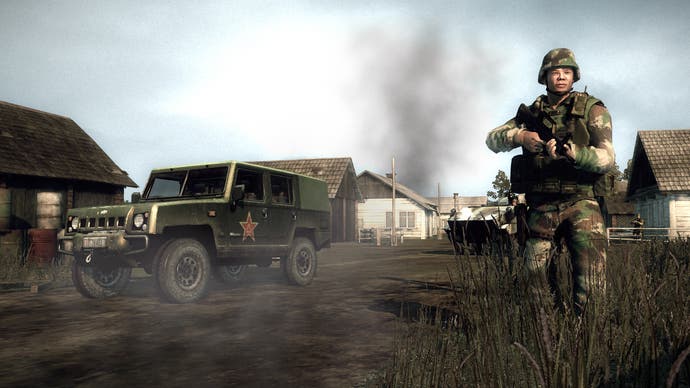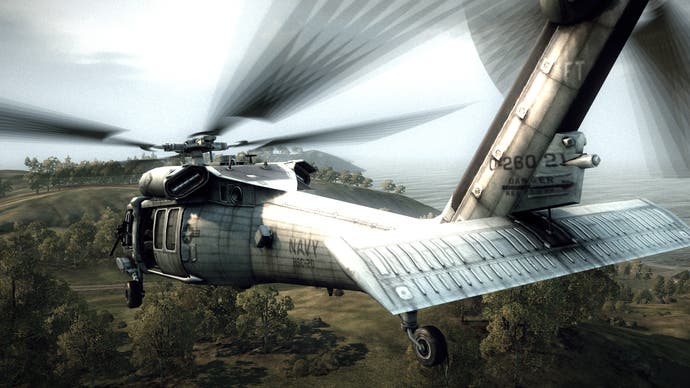Operation Flashpoint: Dragon Rising
Mao than meets the eye.
"I love war movies and I love the bits when people die in war movies," says Sion Lenton, executive producer of Operation Flashpoint: Dragon Rising, with a disturbing glint in his eye. More specifically, Lenton's talking about the lengths he went to in order to ensure this updated version doesn't skimp on the horrors of war. "Catastrophic damage" is how he describes the injury model in this long-awaited sequel to the 2001 cult PC hit, which left many FPS addicts weak-kneed with its brutal realism, and his dedication to detail extends to letting the animation team film him writhing on the office floor in mock agony for visual reference.
There's little doubt that the Flashpoint boys take their war very seriously. We're gathered in the meeting-cum-demo room at Codemasters' rural headquarters, and arranged menacingly on the table is a veritable arsenal of life-sized weaponry. They're mostly replicas and airguns but, much like the game currently being polished off in deepest Warwickshire, they look and feel like the real thing. The game itself - due for PC, PS3 and Xbox 360 - is now in the final few months of refinement and testing, and far from exhausted the team are like eager puppies, excited and happy to show off their virtual theatre of war to a new audience.
For this belated follow-up, the action shifts from the Cold War setting of the original to a new and timely tale based around the fight for natural resources on Skira, an island near the "arse end of Russia". It's a real place, although its real name is Kiska, and its 36km length lies nestled in the Aleutian island chain, the subject of numerous invasions and conquests over the past six centuries. The Russians, Chinese and Japanese have all claimed the territory at some point, and with one of the last untapped reserves of gas and oil lurking beneath its crust, it's the perfect place for an all new flashpoint crisis.

For the purposes of the game, the global economic crisis forces the Chinese to adopt a more aggressively expansionist worldview, which brings them to Skira and into battle with Russian forces there. Players take the role of a US Marine Corps unit intervening in the conflict. As with all things Flashpoint, few liberties have been taken with the facts: the Marine unit in question is the one actually stationed in Okinawa which would respond to such a situation, the boats that deliver you to the island are the exact same boats that would be used, and even the tiny digitised screws and bolts on the Javelin missile launchers are in the right place.
"The word 'sim' is used a lot," admits Lenton, tackling the daunting hardcore reputation that Operation Flashpoint has built up over the last eight years, thanks to its unforgiving approach to military combat. All these years later, it's still a title that comes up when the old PC vs. console debate rears its tatty head, an example of the sort of deep, challenging gameplay that the woolly-minded joypad addicts are supposedly unable to grasp. This could be something of a problem, given that this sequel is being developed for PC and consoles simultaneously.

"One of my personal bugbears is the belief that PC gaming and console gaming have IQ requirements that are different," insists Clive Lindop, the game's senior designer, AI specialist and a veteran of the original Flashpoint community. "It's simply not true. Originally, the quick-command system was developed to allow console players to be able to give the same complex orders as the PC players." This system, which uses a three-tier HUD selection process to issue context sensitive orders quickly and efficiently, is at the heart of the cross-platform development.


